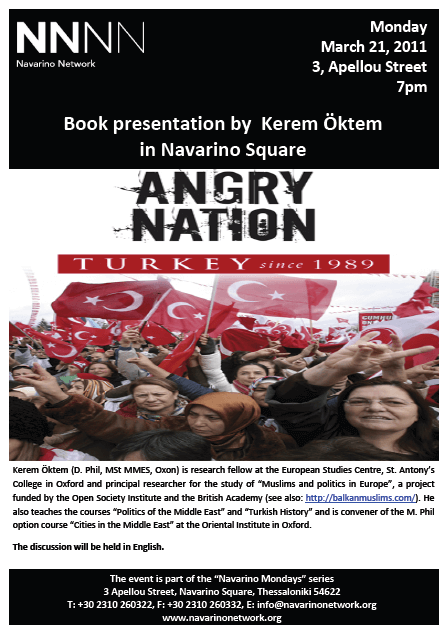- March 21, 2011
- Navarino Network
On March 21, 2011, Navarino Network proudly hosted the book presentation Angry Nation- Turkey since 1989 by Kerem Öktem.
Turkey is a neo-liberal success story and has turned into one of the most influential operators of the region. However throughout this process, the republic has failed to solve its ethnic, religious and historical conflicts peacefully.
With his critical post-Kemalist approach Öktem tries to make a contribution to current Turkish history, which is shaped by a teleology of nationalism. The author characterizes Turkey as “a country that is known more for the metaphors with which it is described than for its rather complex politics, society and history”. (Öktem, 2011, p1.) Violent struggles over power have shaped Turkey until today, hence the author sees the need of defining the official historical narrative as a discourse.
Öktem collected data using ethnographic field research in the course of collecting interviews with Turkish academics, activists, and politicians. In addition he explored key issues such as Kurdish separatism and the relationship between religion and the state.
His work deals with issues within Turkey such as its recent history, political institutions, leadership roles, political institutional framework, and prevailing ideologies. Overall Öktem emphasizes the duality between the elected government on the one side and the non-elected guardians of the republic. The latter group is compromised of the actors who shaped Turkey’s politics for more than 50 years and are referred to as the ‘deep state’ which includes the military high command, the high judiciary and bureaucracy.
Summing up Öktem tries to give the reader a wider perspective of the manipulative nature of the guardian state by rewriting Turkish history and by putting emphasis on those who were disempowered by the elites.
Biography – Kerem Öktem
Kerem Öktem (D. Phil, MSt MMES, Oxon) is research fellow at the European Studies Centre, St Antony’s College and principal researcher for the study of Muslims and politics in Europe, a project funded by the Open Society Institute and the British Academy (see also: http://balkanmuslims.com/). He also teaches the courses Politics of the Middle East and Turkish History and is convenor of the M. Phil option course ‘Cities in the Middle East’ at the Oriental Institute in Oxford.
Dr Öktem read Modern Middle Eastern Studies at the Oriental Institute Oxford and completed his D. Phil. thesis on the spatial dimensions of nation-building at the School of Geography in Oxford in 2006. His research interests are informed by his area studies background and his expertise on Turkey. It ranges from the history of nationalism, ethnic politics and minority rights in Turkey to debates on history and memory and Turkey’s relations with Armenia and Greece. He has also worked on nations and minorities in the larger Mediterranean area and is contributor to the Research Network RAMSES at the Maison Méditerranéenne des Sciences de l’Homme in Aix-en-Provence, where he co-edits, with Henk Driessen, a ‘Concise Dictionary of the Mediterranean’.
Kerem Öktem is a regular contributor to Middle East Report and publishes on current affairs in the New Humanist and in Open Democracy. His most recent books are: Shifting boundaries: Nationalism and Transnationalism in South East Europe (Brill, forthcoming 2011) with Dimitar Bechev; Angry Nation. Turkey since 1989 (Zed Books, 2011); Turkey’s Engagement with Modernity (Palgrave Macmillan, 2010) with Celia Kerslake and Philip Robins; In the long shadow of Europe. Greeks and Turks in the era of Post-Nationalism (Brill, 2009) with Kalypso Nicolaidis and Othon Anstasakis; and Mutual Misunderstandings: Muslims in the European media (European Studies Centre, 2009).
In 2010, his scholarly papers appeared in Multicultural Discourses and the European Journal of Turkish Studies, as well as in two collections on gender politics in Turkey (‘Alles Stehende verdampft: Homosexuelle Bewegungen und Identitäten im Kontext patriarchaler Machstrukturen’, Holzleithner, Elisabeth and Sabine Strasser, Multikulturalismus queer gelesen (Campus) and on toponymical nationalism in Greece and Turkey (‘Ulus, zaman ve mekan: Türkiye ve Yunanistan’da toponomik politikalar’, in: Millas, Herkül and Aslıhan Doğan Topçu, Sözde Masum Milliyetçilik (Kitap).
Watch the video of the event
Related media
